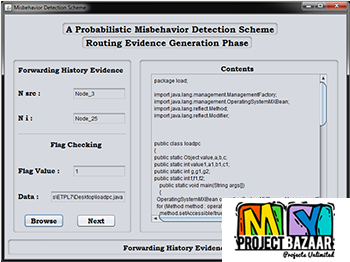
Opportunistic Routing With Congestion Diversity in Wireless AdHoc Networks
Product Description
Opportunistic Routing With Congestion Diversity in Wireless AdHoc Networks
Abstract— The problem of routing packets across a multi-hop network consisting of multiple sources of traffic and wireless links while ensuring bounded expected delay. Each packet transmission can be overheard by a random subset of receiver nodes among which the next relay is selected opportunistically. The main challenge in the design of minimum-delay routing policies is balancing the trade-off between routing the packets along the shortest paths to the destination and distributing the traffic according to the maximum back pressure. Combining important aspects of shortest path and backpressure routing, this paper provides a systematic development of a distributed opportunistic routing policy with congestion diversity(D-ORCD). D-ORCD uses a measure of draining time to opportunistically identify and route packets along the paths with an expected low overall congestion. D-ORCD with single destination is proved to ensure a bounded Expected delay for all networks and under any admissible traffic, so long as the rate of computations is sufficiently fast relative to traffic statistics. Furthermore, this paper proposes a practical implementation of D-ORCD which empirically optimizes critical algorithm parameters and their effects on delay as well as protocol overhead. < final year projects >
Including Packages
Our Specialization
Support Service
Statistical Report

satisfied customers
3,589
Freelance projects
983
sales on Site
11,021
developers
175+Additional Information
| Domains | |
|---|---|
| Programming Language |
















